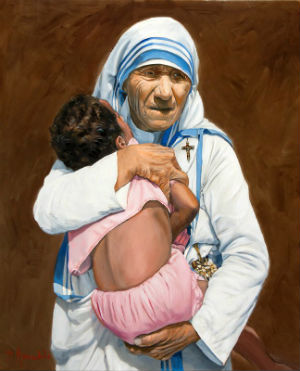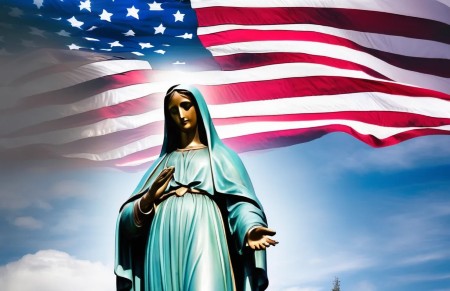We ask you, humbly: don't scroll away.
Hi readers, it seems you use Catholic Online a lot; that's great! It's a little awkward to ask, but we need your help. If you have already donated, we sincerely thank you. We're not salespeople, but we depend on donations averaging $14.76 and fewer than 1% of readers give. If you donate just $5.00, the price of your coffee, Catholic Online School could keep thriving. Thank you.Help Now >
The 'Hierarchy of Values' and the Presidential Candidates
FREE Catholic Classes
I cannot and will not endorse any candidate who does not hear the cry of the "poorest of the poor", children in the first home of the whole human race.
Highlights
Catholic Online (https://www.catholic.org)
4/12/2008 (1 decade ago)
Published in Politics & Policy
LOS ANGELES (Catholic online) - The notion of following a hierarchy of values is essential in applying the principles of Catholic Social teaching.
It is becoming a matter of particular importance in the upcoming Presidential contest in the United States of America.
I have written regularly concerning the principles found in Catholic Social teaching and their application. My articles have received a lot of response, not all of it affirming.
When I have raised numerous issues which should concern Catholics, such as the Vatican's proper opposition to the initial entry into Iraq as not fitting the strict "Just War" analysis, our obligations to the poor, economic justice, solidarity and health care, and other issues not prominently addressed by some who identify themselves as "conservatives" or "neo-conservatives", I have received some hostile letters.
In addition, when I have given a forum to articulate, concerned and faithful Catholic scholars like Law Professor Doug Kmiec, some readers have gone beyond anger to early morning name calling by E-Mail; even though I have made it absolutely clear that I disagree with him in his endorsement of the candidacy of Senator Barack Obama for President.
However, as this election unfolds, I am of the opinion that the Senator from Illinois is probably going to be the nominee for his Party. I for one am glad that thoughtful Catholics like Professor Kmiec, Senator Bob Casey, and former Representative Tim Roemer are at least advising him. I pray they will influence him toward the recognition of the rights of all human persons, at every age and stage.
Years ago I watched another man become aware of the truth concerning the sanctity of every human life, at every age and stage. I helped the process all that I could. He ended up running for President and I served as an advisor.
His name is Steve Forbes.
So, my prayer is that the compelling truth concerning the humanity of our neighbor in the womb will become clear to the Senator from Illinois and I would rather have Pro-life folks around him to help that to happen.
However, as I have written clearly and repeatedly, I cannot and will not endorse any candidate, no matter what their Party identification or their position on other issues, who does not hear the cry of the "poorest of the poor", children in the first home of the whole human race.
I have also explained, and will do so again below, that my position on the fundamental human right to life is not "single issue" politics. Rather, it is rooted in my conviction that Life is more than an issue, it is a "hermeneutic", a lens through which every other issue must be viewed. I also believe that there is a hierarchy of values in the application of Catholic Social teaching.
In a February 7, 2008 speech during which he discussed the U.S. Bishops' 2007 document, "Forming Consciences for Faithful Citizenship: A Call to Political Responsibility", Bishop Nicholas DiMarzio of Brooklyn, New York gave the assembled gathering a very helpful example of how to apply such a hierarchy.
He reminded those assembled that "our faith must inform our political decisions" and that Catholic voters are obliged to distinguish "between moral evil," such as abortion, "and matters of prudential judgment," such as tuition tax credits.
The good Bishop was chairman of the Bishops' domestic policy committee and helped to draft the document. He began with the issue of the right to life saying, "In our own country, despite significant victories that extend protection to the unborn, this modern slaughter of the holy innocents continues because of the policies of unscrupulous politicians".
He continued "Only in circumstances that are extraordinarily hard to contemplate may a Catholic voter support a proponent of so great an intrinsic moral evil".
He then addressed legislative efforts "that would undermine the family by redefining marriage" and strongly criticized any efforts to do so, saying that they would undermine the family and the entire social order. Since it is the role of the Government to protect the common good, the Bishop rightly insisted that it would be against the common good to extend "the benefits of marriage" to same-sex couples.
Next, he moved to the area of education, addressing educational or parental choice, which he supports. He addressed it as an issue of parental choice and the primacy of the family as well as an issue of economic justice saying "the working-poor Catholic families of our state and diocese that are making a contribution to the common good continue to be disenfranchised."
In contrast to a moral evil like abortion, the Bishop pointed out that ones position on educational tax credits is a matter of prudential judgment saying "People of good faith are free to disagree...The church doesn't say that people can't take the wrong position, the church only says you cannot take a position that will promote immorality."
After addressing numerous other public policy issues, the Bishop turned to the War in Iraq saying that Pope Benedict XVI "has made no secret of his personal opposition" to the conflict, "in which 4,000 servicemen and servicewomen have died, 50,000 have been wounded and the lives of tens of thousands, perhaps even a hundred thousand, Iraqis have been crushed."
He properly noted that many Catholic theologians contend that a pre-emptive war can never be justified in Catholic teaching. However, he indicated that it was his opinion that, under the current conditions, debate over issues such as the timing of withdrawal "is a matter of prudential judgment."
I share the Bishop's analysis with my readers because I think it is an example of what Catholics should do as we face this current campaign. In the application of issues in accordance with the hierarchy of values, I have decided that I must hear the cry of the ones whom Blessed Teresa of Calcutta called the "poorest of the poor", the children living in the wombs of their mothers. After all, they have no voice but ours.
I know some who disagree because I use the life issues as the first criteria for my personal evaluation of the candidates. To them I insist that right to life is a "hermeneutic", a lens through which we must examine all of our other claims of compassion for the poor. Without the right to life there are no other rights and the infrastructure of rights is thrown into jeopardy. Rights become the exclusive province of the more powerful who can make the so called "choice" to take your life.
Even if the positive law of a Nation calls what is wrong a "right", and even if unelected Justices create a "penumbra" out of whole cloth behind which to hide the evil, purporting to be engaging in some kind Constitutional analysis, it is not right. The Natural Law and science confirm what we have always known, that the child in that womb is our neighbor.
We simply should not kill our neighbor. The late Servant of God John Paul II in his Encyclical letter "The Gospel of Life" (Evangelium Vitae) warned of what has happened to our Nation and much of the West. I think it is vital and timely to consider his words. He wrote concerning societies where:
"....the promotion of the self is understood in terms of absolute autonomy, people inevitably reach the point of rejecting one another. Everyone else is considered an enemy from whom one has to defend oneself. Thus society becomes a mass of individuals placed side by side, but without any mutual bonds.
"Each one wishes to assert himself independently of the other and in fact intends to make his own interests prevail. Still, in the face of other people's analogous interests, some kind of compromise must be found, if one wants a society in which the maximum possible freedom is guaranteed to each individual. In this way, any reference to common values and to a truth absolutely binding on everyone is lost, and social life ventures on to the shifting sands of complete relativism.
"At that point, everything is negotiable, everything is open to bargaining: even the first of the fundamental rights, the right to life.
"This is what is happening also at the level of politics and government: the original and inalienable right to life is questioned or denied on the basis of a parliamentary vote or the will of one part of the people-even if it is the majority. This is the sinister result of a relativism which reigns unopposed: the "right" ceases to be such, because it is no longer firmly founded on the inviolable dignity of the person, but is made subject to the will of the stronger part.
"In this way democracy, contradicting its own principles, effectively moves towards a form of totalitarianism.
"The State is no longer the "common home" where all can live together on the basis of principles of fundamental equality, but is transformed into a tyrant State, which arrogates to itself the right to dispose of the life of the weakest and most defenseless members, from the unborn child to the elderly, in the name of a public interest which is really nothing but the interest of one part.
"The appearance of the strictest respect for legality is maintained, at least when the laws permitting abortion and euthanasia are the result of a ballot in accordance with what are generally seen as the rules of democracy.
"Really, what we have here is only the tragic caricature of legality; the democratic ideal, which is only truly such when it acknowledges and safeguards the dignity of every human person, is betrayed in its very foundations:
"How is it still possible to speak of the dignity of every human person when the killing of the weakest and most innocent is permitted? In the name of what justice is the most unjust of discriminations practiced: some individuals are held to be deserving of defense and others are denied that dignity?"
"When this happens, the process leading to the breakdown of a genuinely human co-existence and the disintegration of the State itself has already begun.
To claim the right to abortion, infanticide and euthanasia, and to recognize that right in law, means to attribute to human freedom a perverse and evil significance: that of an absolute power over others and against others. This is the death of true freedom: "Truly, truly, I say to you, every one who commits sin is a slave to sin" (Jn 8:34)." (Pope John Paul II)
Sadly, our Nation may be on the path to becoming such a "tyrant State" if there is no change concerning this fundamental human rights issue.
Without the freedom to be born, there are no other freedoms. Freedom is a good of the person. Children in the womb, like all of us, are human persons. Personhood cannot be limited to only those perceived to not be "dependent" on any other persons or we will soon eliminate many other categories of human persons.
Beside which, it is our dependency upon each other which actually makes us human. Our claims of compassion, the etymology of which means to "suffer with", are exposed as a fraud when we do nothing to stop the killing of innocents in the womb, once the safest place on earth, with chemical weapons and surgical strikes.
This must not continue.
If there is a hierarchy of values, and there is, then the way that I read Catholic Social teaching, saving innocent human life from being killed in the womb is at the top of the ladder. Here is where the principles of Catholic Social teaching come in.
My position on this issue is not simply my opinion. It is based upon my sincere, long term effort to study and apply the Social teaching of the Catholic Church according to a hierarchy of application in my citizenship and political participation.
On this, Doug Kmiec and I completely disagree. However, his voice should be heard. He also continues to be a man for whom I hold a high regard and one whom I call friend.
This article contains material adapted from Deacon Fournier's Booklet entitled "Catholics, Voting and the Common Good" available from Catholic Online
---
'Help Give every Student and Teacher FREE resources for a world-class Moral Catholic Education'
Copyright 2021 - Distributed by Catholic Online
Join the Movement
When you sign up below, you don't just join an email list - you're joining an entire movement for Free world class Catholic education.
-

-
Mysteries of the Rosary
-
St. Faustina Kowalska
-
Litany of the Blessed Virgin Mary
-
Saint of the Day for Wednesday, Oct 4th, 2023
-
Popular Saints
-
St. Francis of Assisi
-
Bible
-
Female / Women Saints
-
7 Morning Prayers you need to get your day started with God
-
Litany of the Blessed Virgin Mary
Eucharistic Unity: Embracing the International Eucharistic Congress in Quito
-

Do you know what really makes Mother Teresa so heroic?
-

Catholic Leaders Call for National Consecration of 2024 Election to the Blessed Virgin Mary
-
The Largest Christian Monument in the World: Brazil Honors St. Michael the Archangel
-
A Biblical Treasure Unveiled: The Tel Dan Stele Finds New Home in Oklahoma
Daily Catholic
 Daily Readings for Saturday, September 07, 2024
Daily Readings for Saturday, September 07, 2024 St. Cloud: Saint of the Day for Saturday, September 07, 2024
St. Cloud: Saint of the Day for Saturday, September 07, 2024 Prayer in Time of Suffering: Prayer of the Day for Saturday, September 07, 2024
Prayer in Time of Suffering: Prayer of the Day for Saturday, September 07, 2024- Daily Readings for Friday, September 06, 2024
- St. Eleutherius: Saint of the Day for Friday, September 06, 2024
- Prayer for our Family #3 - Mother Teresa of Calcutta: Prayer of the Day for Friday, September 06, 2024
![]()
Copyright 2024 Catholic Online. All materials contained on this site, whether written, audible or visual are the exclusive property of Catholic Online and are protected under U.S. and International copyright laws, © Copyright 2024 Catholic Online. Any unauthorized use, without prior written consent of Catholic Online is strictly forbidden and prohibited.
Catholic Online is a Project of Your Catholic Voice Foundation, a Not-for-Profit Corporation. Your Catholic Voice Foundation has been granted a recognition of tax exemption under Section 501(c)(3) of the Internal Revenue Code. Federal Tax Identification Number: 81-0596847. Your gift is tax-deductible as allowed by law.










 Daily Readings for Saturday, September 07, 2024
Daily Readings for Saturday, September 07, 2024 St. Cloud: Saint of the Day for Saturday, September 07, 2024
St. Cloud: Saint of the Day for Saturday, September 07, 2024 Prayer in Time of Suffering: Prayer of the Day for Saturday, September 07, 2024
Prayer in Time of Suffering: Prayer of the Day for Saturday, September 07, 2024


